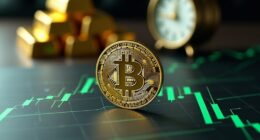In a move that ostensibly champions retail traders, Robinhood’s launch of micro XRP futures—contracts representing a mere 2,500 XRP and slashing traditional margin requirements—raises the question whether this is genuine democratization or a calculated gambit to ensnare smaller investors in leveraged bets they scarcely understand; by trimming capital barriers and touting zero commissions, Robinhood simultaneously lowers the threshold for participation and the guardrails against reckless speculation, exposing a tension between accessibility and responsibility that few platforms dare to confront so bluntly. These micro futures, part of a broader rollout including Solana and Bitcoin contracts, ostensibly offer retail traders professional-grade tools once reserved for institutional players, yet the fine print reveals a subtler reality: the seductive appeal of near-24/7 trading and rapid execution might just be a siren song luring novices into volatile waters with insufficient preparation. Robinhood’s introduction of a trading ladder interface further enhances execution capabilities but may amplify impulsive decision-making among inexperienced users. The contracts are cash-settled, which simplifies the settlement process compared to physical delivery, making them more accessible for retail participation.
Each contract, pegged to approximately $5,200 worth of XRP, allows granular position sizing down to 0.0005 XRP ticks, ostensibly reducing risk but *arguably* inviting a false sense of security, as smaller margin calls can still spiral into outsized losses. The partnership with CME Group, following Robinhood’s earlier futures introduction in commodities and indices, signals a strategic pivot to cement dominance in crypto derivatives, leveraging its zero-commission model to undercut competitors like Coinbase. Meanwhile, the timing coincides conveniently with XRP price surges tied to Ripple’s corporate maneuvers, a stark reminder that retail traders often face markets swayed more by institutional headlines than grassroots insight.
Robinhood’s broader ambition to morph into a “financial super app,” buttressed by its Bitstamp acquisition and AI integration plans, positions it as a formidable gatekeeper to a new era of financial inclusion—or financial entrapment, depending on one’s perspective. By packaging complex instruments into bite-sized contracts, Robinhood flirts with empowering a generation hungry for market access but *arguably* equipped with insufficient risk literacy, raising uncomfortable questions about where innovation ends and exploitation begins.









